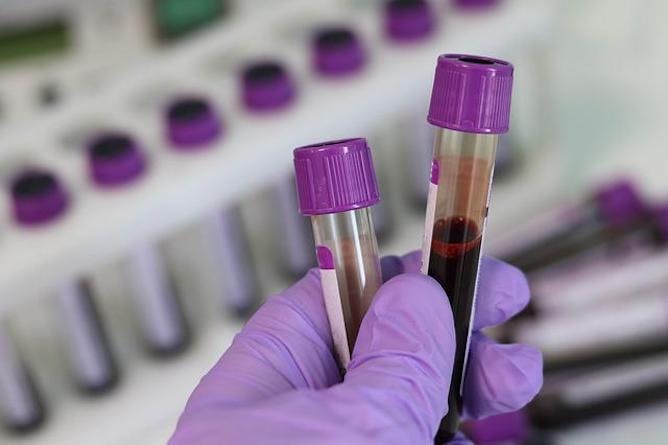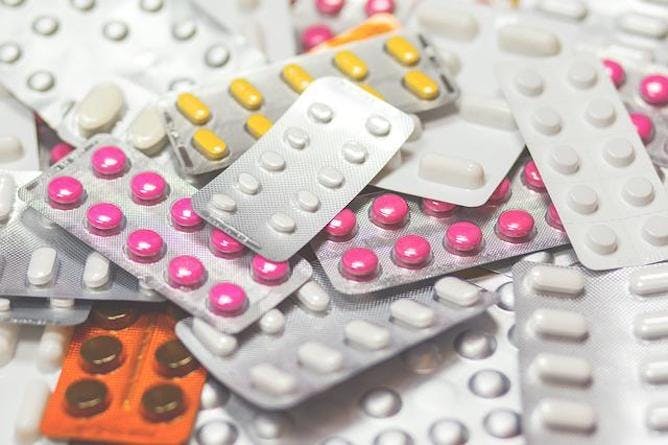What Prescription Drugs Can You Not Drive on in the UK?
February 13, 2024
•5 min read

Sam Plant
Content Writer

Drug driving is illegal — right? Well, if we’re talking about illicit substances, absolutely. But what happens when you take perfectly legal medication as prescribed by your doctor, and then get behind the wheel?
Most of us will be prescribed meds at one point or another within our driving lifetime, whether it’s antibiotics, antidepressants or opioids. A 2021 survey even found that a whopping 15% of people in England take more than five types of medicines each day. And you only have to glance at the leaflet in any packet of pills to know that there’s the potential for some pretty nasty side effects.
So which types of drugs are safe to drive on? And which could see you face a driving ban, unlimited fine and six months banged up in prison? Let’s take a look.
What does the law say about drug driving?
There are two parts of drug driving law that could potentially prohibit you from driving while on prescription medication:
- Driving while unfit
- Driving while over the prescribed drug limit
Driving while unfit

This section of the law bans you from driving or being in charge of a vehicle if you’re impaired due to drink or drugs. Section 4 of the Road Traffic Act tells us this in no uncertain terms:
“A person who, when driving or attempting to drive a mechanically propelled vehicle on a road or other public place, is unfit to drive through drink or drugs is guilty of an offence.”
Unfit to drive means you’re impaired in some way: your ability to safely operate and control a car is diminished. This law doesn’t distinguish between legal or illegal drugs; it focuses on the impact they have on you.
There are several common side effects you may experience on prescription medicine that could impair your driving, including:
- Slower reactions
- Dizziness
- Blurred vision
- Difficulty concentrating
- Inability to make decisions quickly enough
If you experience any of these symptoms, you should avoid driving until they pass.
Driving while over the medication limit

This law was introduced in 2015 and aims to tackle abuse of commonly prescribed legal drugs. If you’re caught with any of the eight named substances above their specified limits in your bloodstream — without a valid prescription — you can be prosecuted for drug driving. That’s regardless of their effect on you, and whether you can be shown to have been driving while impaired.
The limits are above those that would usually arise from using the drugs as prescribed. However, even if you do have more than the legal limit in your bloodstream, you won’t be in breach of the law if you:
✔ Were prescribed, sold or supplied the drug by a medical professional to deal with a medical or dental problem,
and
✔ Took it according to instructions from your doctor, pharmacist, dentist or the leaflet that came with your medication
Here are the legal limits for prescription drugs:
Medicine drug
Threshold limit in blood
clonazepam
50µg/L
diazepam
550µg/L
flunitrazepam
300µg/L
lorazepam
100µg/L
methadone
500µg/L
morphine
80µg/L
oxazepam
300µg/L
temazepam
1,000µg/L
amphetamine
250µg/L
Remember, even if you're below these limits, you could still be prosecuted if there’s evidence you were impaired behind the wheel.
What medication could stop you from driving?

Any medication that makes you drowsy, for one example, could stop you driving. Sleeping pills tell you not to drive or operate machinery when you are under their influence. But for some other drugs, the risks to driving may be a little less obvious.
According to the government, these are commonly prescribed medicines that can affect your driving:
- amphetamines (e.g. dexamphetamine or selegiline)
- clonazepam
- diazepam
- flunitrazepam
- lorazepam
- methadone
- morphine or opiate and opioid-based drugs (e.g. codeine, tramadol or fentanyl)
- oxazepam
- temazepam
Things get a little complicated because drugs are sometimes prescribed under different names. So even if you don’t recognise your medication on this list, check that they aren’t really the same thing. Talk to your doctor if you're taking any of them for a medical condition you have. It’s usually best to avoid driving on them until you know how they affected you.
But it’s not just these substances to watch out for. If you have side effects from any prescription drug that causes you to be impaired, you can be prosecuted.
What are the penalties for drug driving?

Naturally, there are pretty serious consequences for being caught drug driving. If you’ve already had a similar conviction, or have had a recent driving disqualification the penalties will be more severe. But as a minimum, you will be served with:
- A driving ban lasting at least one year
- An unlimited fine
- A prison sentence of up to six months
- A criminal record
Should you cause an accident while unfit to drive or driving over the prescribed limit, there’ll be greater repercussions. And if anyone dies as a result, you could be sentenced to up to 14 years behind bars.
FAQs
1. How do I know whether I’m over the drug limit?
It’s impossible to predict, with any accuracy, what quantity of legal medications you can take before they affect your driving, or how long after taking them you might be fit to drive. That’s because there's a whole range of factors that can influence the concentration of drugs in your bloodstream. Metabolism plays a big role, as can the amount you’ve eaten or drunk. The government refuses to advise on this matter for exactly that reason: too many variables make any estimation of quantities or timings unreliable.
The best things you can do are to take the medication exactly as prescribed and remain vigilant of any side effects. That way, you won’t be committing an offence when you get behind the wheel.
2. How can you be tested for drug driving?
If you’re pulled over by the police and they suspect you to have drugs in your system, you may be asked to perform a field impairment assessment. This will probably involve tests like walking in a straight line, just like if you were driving under the influence of alcohol. They may also get you to take a drug test then and there — but these types of tests can only determine whether you’ve taken cannabis or cocaine.
If they’ve witnessed signs of you being impaired, the next step is for the police to arrest you and take you to the station. There you’ll undergo more rigorous testing in the form of a blood or urine sample.
It’s important that you comply with any tests the police ask you to do. If you refuse to co-operate — and don’t have valid medical grounds for doing so — you can be charged with a criminal offence. You’re likely to incur penalty points, a driving ban, and a large fine, and in some cases may even face imprisonment.
3. What other consequences might I face for drug driving?
A drug-driving conviction will stay on your driving record for 11 years, and will be visible to your employer if you have to drive for work. You will also have to declare it to your insurance company, so you’ll probably see a significant hike in the premium you’re asked to pay. And one consequence you might not think of: you may struggle to obtain entry to certain countries, like the United States.
All in all, avoiding drug driving is definitely worth the price of a taxi.
Subscribe for driving advice, offers & more
We'd love to let you know about our courses, news and offers via email. You may unsubscribe at any time.
Star Genie Limited trading as PassMeFast. Company number 10093359
Copyright © 2024 owned by Star Genie Limited
PassMeFast, Blue Tower, MediaCityUK, Salford, M50 2ST
